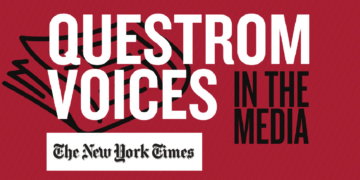Bin Gu, Professor of Information Systems discusses how The “Buy American-Hire American” executive order, aimed at strengthening U.S. employment and limiting foreign worker access, has unintentionally prompted high-tech multinational companies to relocate jobs overseas, revealing the complexities of balancing immigration policy and global workforce needs:
Can you explain how the “Buy American-Hire American” executive order has inadvertently led to the relocation of high-tech jobs to multinational branches overseas? What factors made these jobs more vulnerable to being moved abroad?
The “Buy American-Hire American” executive order, signed in April 2017, sought to bolster the U.S. economy by promoting domestic products and restricting skilled foreign workers. However, this policy has inadvertently led to an increase in high-tech job postings abroad, particularly for multinational companies for the following reasons:
- The order’s restrictions on H-1B visas, crucial for tech companies recruiting skilled foreign workers, have significantly impacted the hiring practices of high-tech multinational firms.
- Faced with stricter criteria and higher denial rates for H-1B visas, these companies have opted to expand hiring in overseas branches instead of increasing domestic employment.
- The phenomenon is especially prominent for the high-tech industry as the vast majority of the jobs in high-tech can be done remotely and high-tech multinationals have the management and technological infrastructure in place to facilitate a global workforce regardless of their physical locations.
How are multinational high-tech firms adapting their strategies to align with or circumvent government regulations like this executive order?
Faced with the “Buy American-Hire American” executive order and its restrictions on H-1B visas, multinational high-tech firms adapt their strategies in the following ways:
- Shifting Job Creation Overseas: Instead of increasing domestic employment as intended by the policy, multinational high-tech firms are significantly increasing their foreign job postings. This strategic shift allows them to continue accessing the global talent pool they rely on without being hampered by U.S. visa restriction.
- High tech multinational firms tend to move jobs to two types of countries: Countries with institutional comparability to the U.S., such as Ireland and Israel, which offer a familiar and stable operating environment. and countries with cheaper or more abundant labor supplies, such as China and India, provide cost advantages.
- Our research also indicates that high-tech firms prioritize moving jobs that are the most reliant on foreign-born employees.
What are the potential long-term impacts on U.S. employment and innovation in the tech sector due to this order?
The long-term impacts could be substantial:
1. Reduced Domestic Employment: While the policy aimed to boost domestic employment, it may actually lead to a decrease in U.S. tech jobs. As multinational high-tech firms shift job creation overseas in response to H-1B visa restrictions, job opportunities for American workers in the tech sector could diminish. This job relocation trend is particularly pronounced in red states, low-income states, and states lacking established tech clusters, further weakening local economies and potentially exacerbating economic disparities.
2. Hindered Innovation: Restricting access to skilled foreign workers through the H-1B visa program could limit the talent pool available to U.S. tech companies. This could hinder innovation and slow technological progress as companies struggle to find the necessary expertise domestically.
3. Weakening of the U.S. Tech Sector: The relocation of high-tech jobs to other countries could weaken the U.S. tech sector’s position as a global leader. As other countries benefit from the influx of talent and investment, the U.S. could lose its competitive edge. This could have broader economic implications, as the tech sector is a major contributor to U.S. GDP and job creation.
4. Increased Offshoring: The study suggests that restrictive immigration policies could encourage U.S. firms to increase offshoring. By moving operations to countries with more favorable immigration policies and access to skilled labor, companies can circumvent U.S. regulations while maintaining their access to the global talent pool. This could further contribute to the decline in domestic employment and weaken the U.S. tech sector’s overall competitiveness. The study suggests that restrictive immigration policies could encourage U.S. firms to increase offshoring. By moving operations to countries with more favorable immigration policies and access to skilled labor, companies can circumvent U.S. regulations while maintaining their access to the global talent pool. This could further contribute to the decline in domestic employment and weaken the US economy in general.
Based on your findings, do you believe policies like “Buy American-Hire American” can be reformed to achieve their intended goals without these negative side effects? If so, how?
The root cause of the high-tech industry hiring a large number of foreign workers is the lack of supply of engineers in the US. Statistics show that only 6% of college students in the US choose to major in engineering, while the percentages are 32% and 12% in China and India with much larger populations. Any policies intended to increase tech industries’ hiring of domestic tech workers need to first address the supply shortage.
Could you elaborate on why high-tech industries, in particular, are experiencing significant job shifts? What specific roles or job types are being relocated?
The phenomenon is especially prominent for the high-tech industry as the vast majority of the jobs in high-tech can be done remotely and high-tech multinationals have the management and technological infrastructure in place to facilitate a global workforce regardless of their physical locations. Our research also indicates that high-tech firms prioritize moving jobs that are the most reliant on foreign-born employees.
Your research shows that certain states are impacted more so than others by these job relocations. How do you think this will affect those states in the long run, especially when it comes to economic growth and job creation? Why do you believe specific states are impacted more than others?
I think this will affect those states in the following way:
Weakening of Local Economies: The relocation of high-tech jobs from specific states will likely result in a decline in economic activity in those areas. With fewer high-paying jobs available, these states could experience reduced tax revenues, lower consumer spending, and a decrease in overall economic output.
Exacerbation of Economic Disparities: The research indicates that job losses are concentrated in red states, low-income states, and regions without established tech clusters. This trend could further widen the economic gap between these states and those that are already economically prosperous and technologically advanced.
Brain Drain: As high-tech jobs move away, skilled workers in those states might be forced to relocate to find suitable employment opportunities. This brain drain could deprive these states of valuable human capital, hindering their ability to attract new investments and foster innovation.
The shift of jobs to places like Ireland, Israel, India, and China seems significant. What do these countries offer that makes them attractive alternatives for high-tech companies?
Institutional Comparability (Ireland and Israel):
Ireland and Israel are countries with strong institutional comparability to the U.S. This suggests that these countries offer similar legal frameworks, regulatory environments, and business practices, which can make it easier for U.S. companies to establish operations and navigate the local business landscape.
Cheaper and More Abundant Labor Supply (India and China):
India and China are known for their cheaper and more abundant labor supplies. This is a significant factor for high-tech companies seeking to reduce labor costs and access a large pool of skilled workers, particularly in engineering and IT.
How can stakeholders in the high-tech industry better navigate or anticipate the impacts of similar governmental policies in the future? Are there strategies that might mitigate the negative consequences observed in your study?
- Diversifying Talent Pipelines: To reduce reliance on any single source of talent, companies should actively diversify their talent pipelines. This can include expanding recruitment efforts to universities and training programs in different countries, partnering with organizations that promote diversity in tech, and developing internal training programs to upskill existing employees.
- Strategic Global Expansion: Companies might consider strategically expanding their operations to countries with favorable immigration policies and a strong talent pool. This can help mitigate the impact of restrictive policies in one country by accessing talent in other regions. This strategy was clearly observed in response to the “Hire American” policy, with companies increasing job postings in countries like Ireland, Israel, India, and China.
- Investing in Automation and Remote Work: While the sources don’t explicitly mention these, companies could explore ways to leverage automation and remote work arrangements. Automation can potentially reduce the need for certain types of labor, while remote work can enable companies to access a wider talent pool regardless of location. However, it’s important to carefully consider the potential implications of these strategies for workforce management, cybersecurity, and other factors.
- Advocating for Policy Reform: High-tech companies should continue to advocate for policy reforms that support the industry’s need for global talent. This includes pushing for reforms to the H-1B visa program, streamlining immigration processes, and promoting policies that attract and retain highly skilled workers.
How do you think these changes are affecting the morale and job satisfaction of workers in the high-tech industry, both in the U.S. and in the countries where jobs are being relocated?
We didn’t study job satisfaction but here are what we think might happen:
- Increased Job Insecurity and Anxiety: The policy’s impact on job relocation could create a sense of job insecurity and anxiety among U.S. high-tech workers. Knowing that their jobs are being moved overseas could lead to stress and decreased job satisfaction.
- Wage Stagnation or Suppression: If the relocation of jobs results in a reduced demand for certain skills in the U.S., it could potentially lead to wage stagnation or suppression for workers in those roles. Companies may feel less pressure to offer competitive salaries if there is a perception that workers have fewer alternative employment options.
- Demotivation and Reduced Innovation: Job insecurity and a perceived lack of career advancement opportunities could demotivate U.S. workers and stifle innovation within the high-tech sector. If talented individuals feel that their contributions are not valued or that their jobs are at risk, they may be less likely to take risks and pursue groundbreaking ideas.























![[Yahoo! News] The Great Resignation: Historical data and a deeper analysis show it’s not as great as screaming headlines suggest](https://insights.bu.edu/wp-content/uploads/QUESTROM-EXPERTS2-360x180.png)

